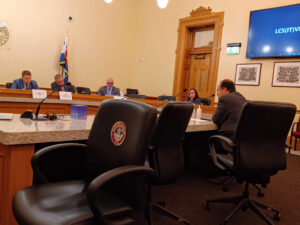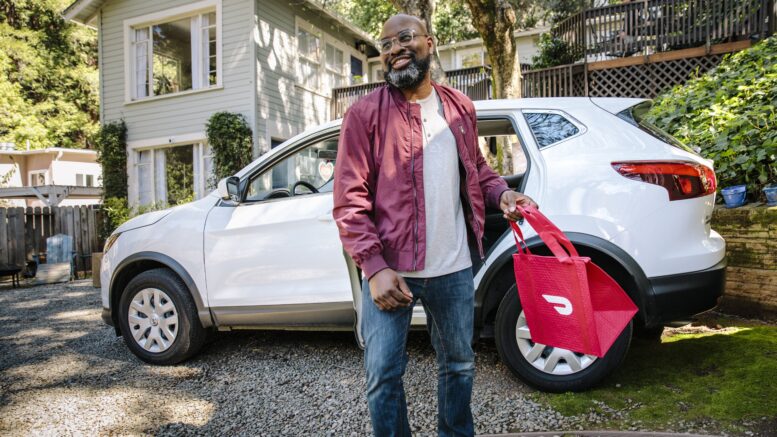Transportation- and delivery-network companies from Uber to DoorDash to Instacart are “working earnestly” to reach agreement on two bills to impose nationally precedent-setting regulations on them, but there remain several deal-killer issues on the table, officials say.
Last year, a first attempt to regulate the companies did not make it to the Senate floor, as it died under questions about its costs, the viability of some of the things it asked of companies and the bigger issue of whether it would accomplish what its sponsor intended. This year, legislative Democrats brought two separate bills — one for transportation companies that transport people and another for delivery companies working with food and groceries, and both passed their first committees in February after changes.
But both Senate Bill 75 and House Bill 1129 haven’t moved since then, with negotiations continuing between the sponsors, their labor-union backers and the companies that would be affected. Company officials say they have come far enough on a range of issues that they would prefer to find consensus and see the bills pass this year rather than waiting to see what new versions might look like in 2025, but there remain big gaps on key provisions.
“We’re still negotiating. But we are working earnestly to try to come to some sort of a compromise,” said Anna Powell, manager of northwestern government relations for DoorDash. The bill (HB 1129) as proposed is unworkable in current form. But we in earnest have worked to come to the table.”
What the bills do
HB 1129, sponsored by Reps. Stephanie Vigil of Colorado Springs and Javier Mabrey of Denver, seeks in revised form to require delivery-network companies to inform both drivers and customers how much drivers will get paid and what the company will make per order. It also seeks to require companies to allow drivers 60 seconds to accept or reject tasks, bars companies from discriminating in task offers against drivers who turn down more offers and post publicly how deactivated drivers can appeal to try to return to platforms.

Colorado state Sen. Robert Rodriguez discusses his bill on gig-worker transparency with the Senate Finance Committee before members killed it in May 2023.
SB 75, sponsored by Sen. Kevin Priola of Henderson and Senate Majority Leader Robert Rodriguez of Denver, similarly would require per-ride payment breakdowns for drivers and riders and dissemination of deactivation policies with steps for potential reinstatement. It also requires transportation-delivery companies to provide the Colorado Department of Labor and Employment information about deactivated drivers, as well as information regarding tasks completed by their Colorado drivers.
The bills come as gig driving has become less a side job and more a full-time profession for many delivery-company contractors, as Denver-area drivers spend an average 38 hours a week in service and 60% rely solely on those jobs for income, Mabrey said. But it also comes as more workers’ groups raise questions about how the companies control the workloads of these independent contractors and how much both the drivers and the company get to keep in pay.
Bills aim to defend drivers
Denver-area drivers receive an average of $10.50 per hour after subtraction of gas and vehicle-maintenance costs while ride-share companies can take between 40% and 70% of drivers’ fares, said Sophie Mariam, labor policy analyst for the Colorado Fiscal Institute. And roughly 15% of area drivers have reported being deactivated — some alleging that they were cut from platforms because of customer accusations that were untrue.
The efforts to lay out what the company gets and what the drivers get in pay are both to inform drivers of their take earlier in the process and to let customers know where their money is going. Meanwhile, the effort to give drivers more time to accept or reject jobs is a public-safety issue, and the ban on discrimination against drivers who take fewer calls is a protection of their ability to contract as they want rather than feel like workers with mandated tasks.

An Instacart worker checks a grocery-delivery order.
“Right now, companies get to have it both ways: They get to say that drivers are independent, without the benefits or protections of employment, while still retaining immense control over the drivers through opaque or altogether hidden algorithms,” Mabrey said during a Feb. 29 House Business Affairs & Labor Committee hearing. “If these companies are going to characterize these drivers as independent, at the very least — the very least — drivers must have basic protections and control over their work.”
Negotiations have produced some consensus
Affected companies have come to many agreements with bill proponents. They’ve accepted the general need to offer price breakdowns for drivers and customers and have agreed to the waiting periods for delivery-network drivers to consider jobs, though Vigil and Mabrey reduced those from two minutes to one minute. They’ve even stopped contesting a provision in both bills giving allegedly wronged drivers a private right of action to sue the companies in court.
However, there are still parts of each bill that companies say go too far or, at least, are likely to have unintended consequences.
HB 1129 has two such provisions about which delivery-network companies say they can’t make a deal without major changes.
The anti-discrimination provision against drivers who reject more jobs would outlaw initiatives like the Top Dasher program in which DoorDash gives its most active contractors first shot at getting more jobs, Powell said. She and executives from other companies have characterized that not only as unfair to workers who seek to make more through hard work but a provision that could slow the delivery process for customers if tasks must be offered to multiple drivers who reject them.
Some provisions unworkable for delivery-network companies

An Instacart worker checks out items for delivery.
Meanwhile, a section of HB 1129 that requires companies to break down pay amounts before customers offer tips at the beginning of their orders is impossible to implement because companies can’t calculate costs until a driver accepts a task, officials said. Plus, the requirement to break costs down on an order-by-order basis is unworkable in instances when companies bundle several smaller orders together to make trips worthwhile and attractive to drivers, several firms said.
“While we appreciate the continued efforts of the sponsors of HB 1129 to engage with stakeholders to find a path forward that works for all parties, we think additional amendments are still needed,” said a statement from Instacart to The Sum & Substance.
Gaps are smaller in the negotiations over SB 75, but company officials are worried that some provisions of the bill could backfire and hurt the workers they are meant to benefit.
For example, the amended version of the bill requires the driver/company pay breakdown to be displayed for consumers in a font that is at least 1.5 times larger than the font used to provide any other information on the screen and that’s presented “using design techniques designed to draw the eye to the information.” Company executives have said this could lead to a reduction in customer tips, both because they might now tip only based upon the amount going to a driver and because the box that allows for entry of a tip will be minimized compared to the large font of this information.
“Unintended consequences” for transportation, delivery companies?
The amount of information requested for the CDLE in the original bill was so massive that the Office of Legislative Council tagged the bill with a $1.3 million fiscal note, due mostly to the 2,283 hours of programming it estimated it would take to enter all the data. An amendment to SB 75 reduced the amount of reporting by transportation-network companies significantly, but questions remain about how the data will be used.
“We appreciate the sponsors’ and advocates’ willingness to work with us on the bill and find a meaningful compromise,” said Harry Hartfield, the lead government-affairs official for Uber in Colorado. “However, much of this bill has never been tried before anywhere in the world, and as we work to implement it, we do expect to see some unintended consequences for riders and drivers.”

A DoorDash driver
Because many of the provisions would be first of their kind — the requirement to allow drivers to see payment breakdowns, the 60-second acceptance time for delivery-network drivers and the private right of action, to name a few — officials want to get the bills right. Hanging over the negotiations is the specter of what’s happened in Seattle, where the city required new mandatory pay rules for delivery-network drivers, companies added fees to bills to cover that and orders have dropped precipitously as customers have revolted and drivers have found themselves with less work and less earnings, according to news stories.
Bills split Republicans, Democrats
Some legislators, particularly a number of Republicans, believe that the state should not be regulating the industries this strictly, even if companies are close to reaching agreement. Sen. Mark Baisley, R-Woodland Park, said during a Feb. 20 Senate Business, Labor & Technology Committee hearing on SB 75 that this was an industry issue, not one into which the government should be forcing itself.
“If we’re trying to get somebody to change their business model, find another line of work,” Rep. Ryan Armogast, R-Berthoud, said of the push by contractors to have the state impose more restrictions on delivery-network companies. “When it comes to overregulation, this bill just says, ‘Hold my beer.’”
But others say that the popularity of the gig economy requires a rethinking of what labor is and how the state can ensure that people are getting paid fairly for what they do. And that is why the nuances of the bills that are under negotiation are so important, they said.
“I would think we have to get ahead of this massive shift in the way people are working … And the market is imperfect in doing that, so I believe our job here is to help the market in a way that works for everybody,” said Rep. Judy Amabile, D-Boulder, before voting to advance HB 1129 on Feb. 29. “I don’t even know if it’s a good idea to have this gig economy. But nonetheless, this is where we are … So I think it’s incumbent on us to figure out a solution that works for everybody.”
